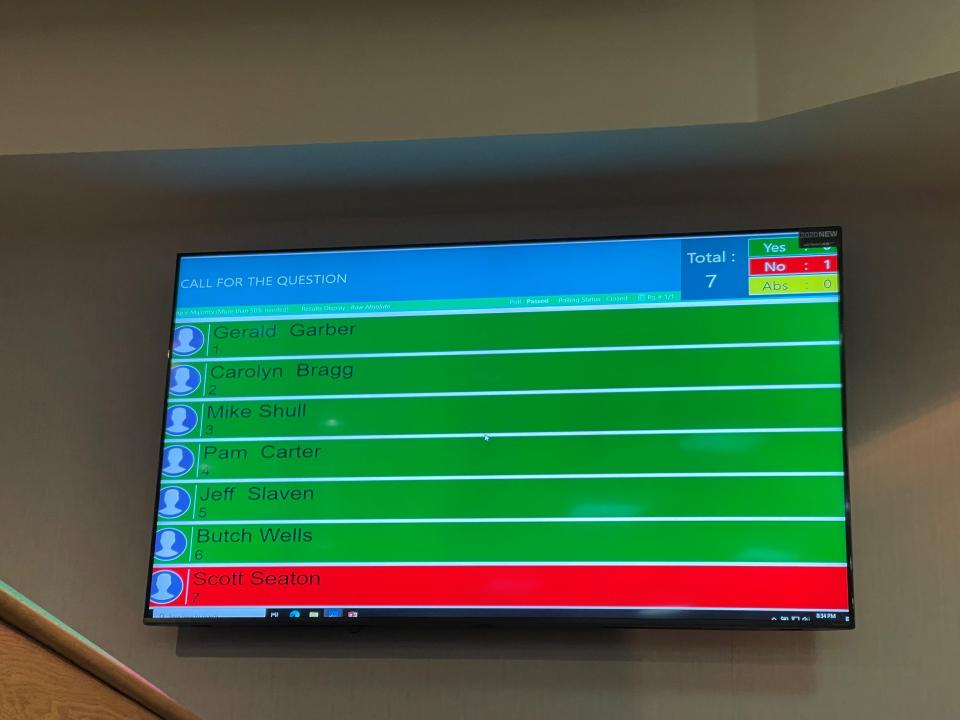Augusta County supervisors pass animal control ordinance amendments
VERONA — Add together one banging gavel, one call to end debate early, three related but unconsidered Augusta County Code sections, and one a legal opinion from the top animal law enforcing lawyer in Virginia. Now you’ve got the recipe for passing the Augusta County animal control ordinance updates.
The Augusta County Board of Supervisors took up the ordinances on Wednesday, comings months after a November vote to delay consideration for more information.
"We have beat this thing in the ground as far as we can beat it.”
Controversy has swirled around the animal control ordinance, leading back to a euthanasia case in early 2023. The ordinance formally establishes the fee schedule for animals picked up by animal control officers and many other revisions. More specific information about what’s in the ordinance changes and its history can be found in The News Leader’s coverage from earlier this week.
Supervisor Butch Wells moved to pass the amendments, followed by a second from Supervisor Pam Carter. Before doing so, Wells expressed support for passing the amendment.
“This has been going on for months and months and months,” said Wells. “It started out as a serious accusation against all seven of the board members, even though one member made the accusation and included all seven of us. We have argued, we have discussed, we have beat this thing in the ground as far as we can beat it.”
Opposition sees more fight left
Supervisor Scott Seaton spoke against passaging the code changes, giving three main reasons.
First, Seaton referred to Section 5-32 D of the Augusta County Code, dealing with requirements for compensation for dead or injured livestock as a result of a loose dog. Second, referred to section 5-22, a ban on dogs running at large, saying the Virginia Supreme Court required some form of negligence or inadequate confinement be part of code about this topic. Third, he was critical of the ordinance including definitions that overlap with state code.
“We’re passing this ordinance here, I’m sure you six have every intention of passing the ordinance, but we’re passing one full of errors,” said Seaton before the vote.
Sherry Helsel, who spoke in the November meeting, was also critical of these three topics. However, Helsel also felt the new ordinance provided overall improvements to the code.
“After being underground on the enforcement issue for decades and bouncing back with an atypical strategy, it was a fair ask that you check and double check you’re entering the world of lawful enforcement for the first time the right way,” said Helsel. “I will thank you for doing the verifications that you’ve done, leave that alone, and be thankful that at least now there’s a system that provides due process, out in the light, beyond just officer and citizen.”
Two public speakers, Dave Zimmerman and Danny Link, expressed support for the ordinance. Link said he has worked with animal control and rescue for the past 30 years, and felt the "policy is not perfect, but it’s what we need.” Another speaker, Jenny Ferraro, who was in the meeting calling for the removal of County Attorney James Benkahla and was often verbally at odds with Slaven, told the supervisors not to trust his legal advice on the ordinance.
Outside opinion weighs in
Chair Jeffrey Slaven read a statement from Michelle Welch, the director of the Animal Law Unit at the Attorney General’s Office who recently presented evidence in the animal seizure civil case against Natural Bridge Zoo. The statement came after Seaton reached out to the Virginia Attorney General’s office for more clarification, according to Slaven.
“I’ve had a lengthy conversation with county attorney James Benkahla,” wrote Welch. “His interpretation of code section 3.2-6543 is reasonable. It allows for civil penalties. I understand you’re relying on the word shall, but there is a case law that interprets shall as not always being mandatory. For an animal at large, there has historically been a low-level, misdemeanor so counties could, under code subsection 3.2-6543 allow for a civil penalty and not convict their citizens of a criminal misdemeanor. The same would apply to unlicensed dogs. Final comment. In other words, it is in the county government’s discretion to make it a civil penalty.”
A call ends debate
As Seaton spoke on his issues with the ordinance, Supervisor Michael Shull spoke up.
“Mr. Chairman, call for the question,” said Shull. If approved, a call for the question motion ends debate on a topic and moves the board onto a vote immediately.
“Sir, I have the floor still,” replied Seaton.
Slaven hit his gavel on the desk in response to Seaton, then explained, “That’s the sound of me having the floor, sir.”
The call was approved six to one, with Seaton voting against. The ordinance updates were then approved six to one, with Seaton voting against.
Lyra Bordelon (she/her) is the public transparency and justice reporter at The News Leader. Do you have a story tip or feedback? It’s welcome through email to lbordelon@gannett.com. Subscribe to us at newsleader.com.

More: Natural Bridge Zoo federal lawsuit withdrawn by zoo owners
More: Augusta supervisors to consider animal control ordinances during Wednesday meeting
This article originally appeared on Staunton News Leader: Animal control ordinance amendments passed in Augusta County

